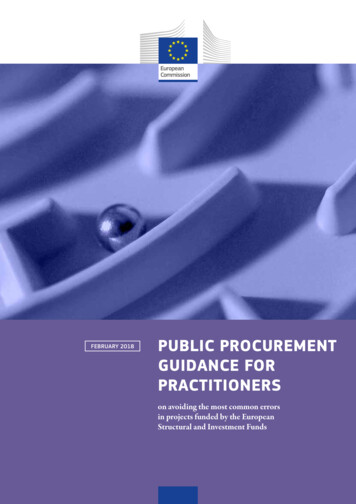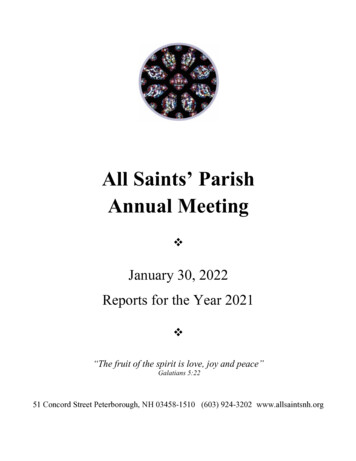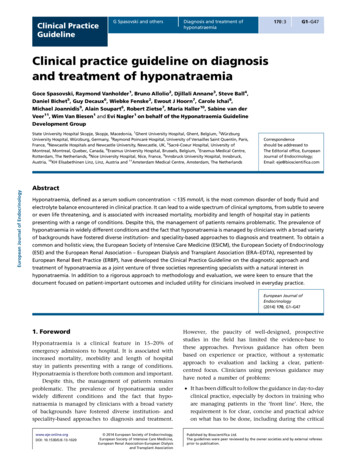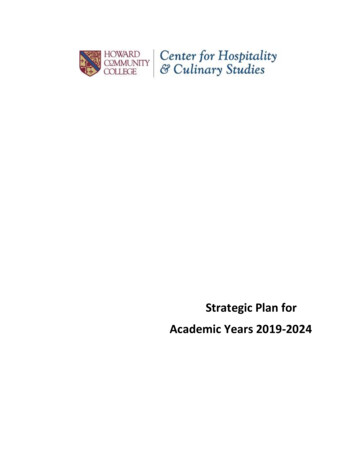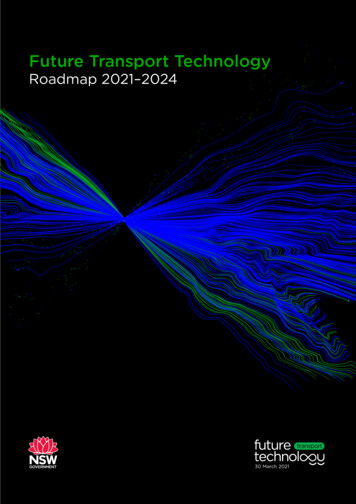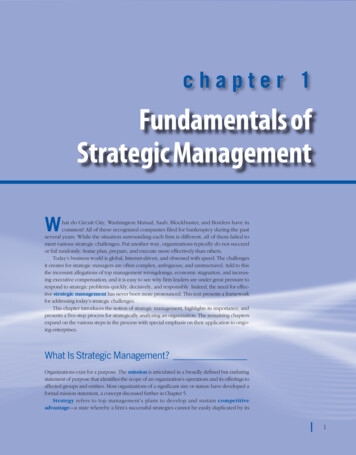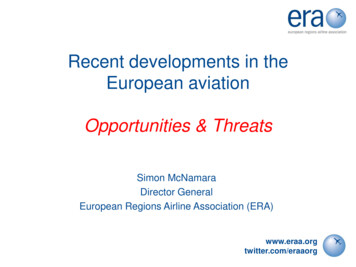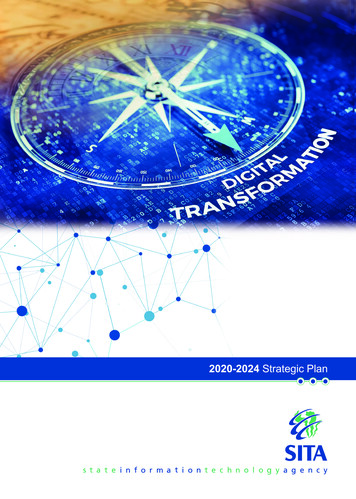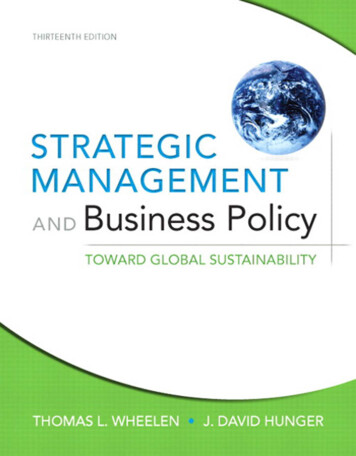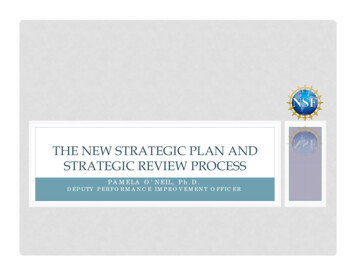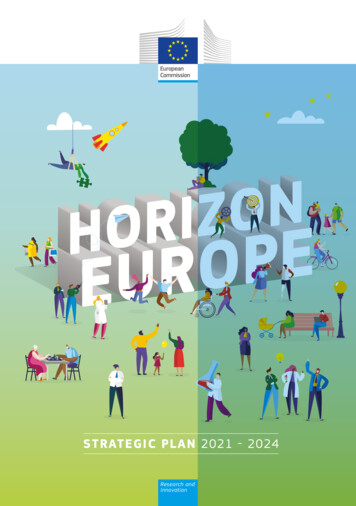
Transcription
STRATEGIC PLAN 2021 - 2024Research andInnovation
Horizon Europe Strategic Plan (2021 – 2024)European CommissionDirectorate-General for Research and InnovationDirectorate A — Policy & Programming CentreUnit Unit A.3 - Horizon Strategic Planning and ProgrammingContactSiv JacobsenEmail siv.jacobsen@ec.europa.eu RTD-PUBLICATIONS@ec.europa.euEuropean CommissionB-1049 BrusselsManuscript completed in February 2021.1st edition.The European Commission is not liable for any consequence stemming from the reuse of this publication.The views expressed in this publication are the sole responsibility of the author and do not necessarily reflect the views of the EuropeanCommission.More information on the European Union is available on the internet (http://europa.eu).PDFISBN -NLuxembourg: Publications Office of the European Union, 2021 European Union, 2021The reuse policy of European Commission documents is implemented based on Commission Decision 2011/833/EU of 12 December 2011 onthe reuse of Commission documents (OJ L 330, 14.12.2011, p. 39). Except otherwise noted, the reuse of this document is authorised undera Creative Commons Attribution 4.0 International (CC-BY 4.0) licence (https://creativecommons.org/licenses/by/4.0/). This means that reuse isallowed provided appropriate credit is given and any changes are indicated.For any use or reproduction of elements that are not owned by the European Union, permission may need to be sought directly from therespective rightholders.
EUROPEAN COMMISSIONHORIZON EUROPESTRATEGIC PLAN 2021 – 20242021Directorate-General for Research and InnovationEN
2HORIZON EUROPE Strategic Plan 2021 – 2024CONTENTSINTRODUCTION.3CO-DESIGN AND CONTENT.6KEY STRATEGIC ORIENTATIONS.7A. PROMOTING AN OPEN STRATEGIC AUTONOMY BY LEADING THE DEVELOPMENT OF KEYDIGITAL, ENABLING AND EMERGING TECHNOLOGIES, SECTORS AND VALUE CHAINS.7B. RESTORING EUROPE’S ECOSYSTEMS AND BIODIVERSITY, AND MANAGINGSUSTAINABLY NATURAL RESOURCES.10C. MAKING EUROPE THE FIRST DIGITALLY ENABLED CIRCULAR, CLIMATE-NEUTRALAND SUSTAINABLE ECONOMY.12D. CREATING A MORE RESILIENT, INCLUSIVE AND DEMOCRATIC EUROPEAN SOCIETY.14EUROPEAN PARTNERSHIPS.17MISSIONS.19INTERNATIONAL COOPERATION.20BRIDGING BETWEEN THE THREE PILLARS OFHORIZON EUROPE.22SPECIFIC ISSUES.25BACKGROUND AND FRAMEWORK.29APPENDICESCLUSTER IMPACT SUMMARY – CLUSTER 1 – HEALTH.33CLUSTER IMPACT SUMMARY – CLUSTER 2 – CULTURE, CREATIVITYAND INCLUSIVE SOCIETY.45CLUSTER IMPACT SUMMARY – CLUSTER 3 – CIVIL SECURITY FOR SOCIETY.55CLUSTER IMPACT SUMMARY – CLUSTER 4 – DIGITAL, INDUSTRY AND SPACE.67CLUSTER IMPACT SUMMARY – CLUSTER 5 – CLIMATE, ENERGYAND MOBILITY . 77CLUSTER IMPACT SUMMARY – CLUSTER 6 – FOOD, BIOECONOMY, NATURALRESOURCES, AGRICULTURE AND ENVIRONMENT .89
HORIZON EUROPE Strategic Plan 2021 – 2024INTRODUCTIONIn recent years we have had to come up with answers to challenges that tested thecore values and principles of the EU as a community. Economic crises, increased globalcompetition, climate change and environmental threats have pushed our understandingof what binds us together as Europeans and made clearer the boundaries of the worldaround us.The COVID-19-pandemic has been the latest test and in many ways the biggest oneyet. It has strained our healthcare and welfare systems and has shaken our societiesand economies and our ways of living and working together. The pandemic and itsconsequences are highlighting the importance for Europe and the world to be betterprepared for and more resilient to systemic shocks, and for our Union to reinforce itsopen strategic autonomy1 and its internal cohesion.The EU has stepped up to these challenges. We are using the moment to acceleratethe twin green and digital transitions and associated transformation of oureconomy, industry and society. This will allow us to build a sustainable, fair and moreresilient Europe and consolidate our global leadership in human-centred innovation andsustainable solutions.For this, we need a strong research, education and innovation foundation, groundedin scientific excellence and competitive innovation policies for European citizens andbusinesses. Our future prosperity and well-being will largely depend on it.Horizon Europe, the ninth European Research and Innovation Framework programme(2021-2027), is one of the key instruments of the Union to steer and accelerate Europe’srecovery, preparedness and resilience. In the context of a new European ResearchArea for research and innovation2, it will strengthen our knowledge base throughfrontier research, spur breakthrough innovation and support the development anddemonstration of innovative solutions, and it will help restore our industrial leadershipand open strategic autonomy. Citizens and businesses expect the Union to lead on thetransformation pathways in a transparent, effective and inclusive way. This journey willtake place within Horizon Europe and its strategic plan will be the map for it.This first Horizon Europe strategic plan defines the strategic orientations for ourresearch and innovation investments over the period 2021-2024 and acts as a compassto stay on course with the political priorities of the Commission with a focus on a climateneutral and green Europe, fit for the digital age, where the economy works for the people.The aim is to ensure an effective interface between EU policy priorities, and programmeactivities and ultimately, the research and innovation projects funded by Horizon Europe3.This will stimulate research and innovation investments where they are needed and, most123‘Open strategic autonomy’ refers to the term ‘strategic autonomy while preserving an open economy’, as reflected in the conclusions of theEuropean Council 1 – 2 October 2020.Communication “A new ERA for Research and Innovation”, COM/2020/628 finalThe strategic planning process focuses in particular on the second pillar of Horizon Europe 'Global challenges and European industrialcompetitiveness'. It also covers relevant activities in the first pillar, ‘Excellent Science’, and the third pillar, ‘Innovative Europe’, and the ‘WideningParticipation and Strengthening the European Research Area part’.3
4HORIZON EUROPE Strategic Plan 2021 – 2024importantly, deliver results. Horizon Europe will approach the twin transitions towards agreen and digital recovery in an ambitious manner and will commit sizeable financialefforts to support the green and digital transformations. In order to reflect theneed to accelerate these transitions following the COVID-19 pandemic, the degree ofinvestment will be considerably increased compared to the current programming periodand proportionate to the level of ambition of the Commission within these areas. The EUMember States, European Economic Area (EEA)4 Countries and the European Parliament,as well as stakeholders and interested citizens, all made a collective effort to design it.Defining objectives together has created a sound foundation for the work to follow. Wewill, however, only achieve these objectives if we are able to continue acting collectivelyat a system level, in line with United Nations Sustainable Development Goals. Thechallenges are complex and interconnected but so are the solutions. We will need moreambitious investments in new knowledge and its diffusion into relevant industries andsociety as a whole. Also, if we wish to do it in a responsible and inclusive way, we willneed even more collaboration – across borders and across disciplines and actors. Thefuture missions and European Partnerships in particular, will promote societal, ecologicaland economic transformations by involving, collaborating with - and building consensusamong citizens and practitioners on research and innovation roadmaps and priorities.The COVID-19 pandemic has revealed multiple vulnerabilities, ranging from thecoordination of emergency health response to manufacturing, not least in the valuechains in the EU’s economy. It has underlined the critical function that digital technologiesplay in running the economy. It also made the EU aware of the need to reduce dependencyand strengthen security of supply, notably in sectors like pharmaceutical ingredients, rawmaterials or food.Therefore, the new framework programme will invest in areas that are of clearstrategic importance for Europe, for example green supply chain components, lowpower electronics, advanced computing systems or future networks. The programmewill also support digital transformation and sustainability goals in health, education,manufacturing, energy, mobility, agriculture and food systems. It will be focused ontransferring the developed knowledge and innovative solutions to real-life environmentswhere they can generate impact and serve citizens.With the presentation of the European Green Deal, the Commission committed to makingthe EU climate neutral by 2050. Such a climate transition requires substantial effortsin research and innovation in the fields of clean technologies and social transitions.Research and innovation will determine the speed at which this transition can takeplace, directly affecting the impacts and co-benefits, such as better air quality, healthysoils and oceans, food and nutrition security, increased employment, social inclusion,sustainable resource management, and reduced dependency on fossil fuels. The rate4Horizon Europe is open for association of EEA States and other third countries and territories, subject to the necessary conditions being met.References to ‘Member States’ and ‘EU’ in the text also include associated countries and territories, as appropriate.
HORIZON EUROPE Strategic Plan 2021 – 2024at which European research and innovation actions succeed in developing, upscaling,implementing, and commercialising such innovative solutions will therefore steer EU’sfuture competitiveness of its existing and newly emerging industries.Horizon Europe will act as a synergetic force across the EU funding programmes.5Through the programme, special attention will be given to ensuring vibrant cooperationbetween universities, scientific communities and industry, including small andmedium enterprises, and citizens and their representatives, in order to bridge gapsbetween territories, generations and regional cultures, especially caring for the needs ofthe young in shaping Europe’s future.Our efforts should be multiplied at international level. The integrated approach tosystemic transitions will reinforce the EU’s efforts in promoting multilateralism anddialogue on the United Nations Sustainable Development Goals. In fact, Europeanresearch and innovation efforts will contribute to new frontiers of human developmentwithin our planet’s ecological boundaries. Faced with the challenges of our time,the cooperation and creativity – especially scientific, social and technological – are thebedrock of peace and prosperity for all.5In particular European Agricultural Guarantee Fund (EAGF) and the European Agricultural Fund for Rural Development (EAFRD); European Maritimeand Fisheries Fund (EMFF); European Regional Development Fund (ERDF); European Social Fund Plus (ESF ); EU4Health; Connecting Europe Facility(CEF); Digital Europe Programme (DEP); Single Market Programme; LIFE - Programme for Environment and Climate Action (LIFE); Erasmus Programme; Union Space Programme; Neighbourhood, Development and International Cooperation Instrument (NDICI) and the Instrument forPre-accession Assistance ('IPA III'); Internal Security Fund (ISF); Border Management and Visa Instrument (BMVI) as part of the Integrated BorderManagement Fund; InvestEU Programme; Innovation Fund under the Emission Trading Scheme (the 'Innovation Fund'); Just Transition Mechanism;Euratom Research and Training Programme; European Defence Fund; and the Recovery and Resilience Facility.5
6HORIZON EUROPE Strategic Plan 2021 – 2024CO-DESIGN OF THE STRATEGIC PLANIn the making of this plan the Commission has pursued an ambitious co-design approach. Theco-design approach aims to: enlarge the ownership of the programme to a broader number of stakeholders; leverage this extended ownership to optimise the effect of Horizon Europe investments.Two series of co-design activities have been organised: remote co-design activities aiming primarily at understanding stakeholders’ views on thecontribution of Horizon Europe to the EU policy priorities. The interactions were organisedthrough the Horizon Europe webpage, with the posting of documentation and surveys. In total,three web-based co-design exercises were organised as part of the strategic planning process,during which 8000 written contributions were submitted. face to face co-design activities aiming primarily at receiving stakeholders’ opinions throughstructured and informal exchanges during the European Research and Innovation Days in 2019. The main messages were summarised in an Orientations report. Other co-design activities may beorganised following the adoption of the strategic plan, notably in case of update or for monitoringand evaluation purposes. Co-design activities may be extended to specific Horizon Europe activities,as relevant, notably through citizen science, open science practices and social innovation.ContentThe result of the innovative co-design process is reflected in four key strategic orientations,supported by 15 impact areas, as presented in this strategic plan. These strategic orientationswill guide the Horizon Europe work programmes until 2024 and will provide the basis for buildingsynergies with other EU programmes and funds, as well as investments in research and innovationat Member State level in the context of the European Research Area.The key strategic orientations and impact areas are formulated on the basis of expected impacts,which have been defined, largely bottom-up, during the co-design process. The impacts definethe wider effects on society, the economy and science to be targeted by research and innovationactivities, but not the manner in which to achieve them. This is entirely up to the imagination andskill of the applicants. The impacts are structured by the six clusters that make up Horizon Europe’ssecond Pillar, ‘Global Challenges and European Industrial Competitiveness’ and are described, alongwith cross-cluster complementarities and intervention areas covered, in six cluster-specificimpact summaries annexed to this document. As such, the key strategic orientations and expectedimpacts set the scene for the research and innovation activities and outputs to be defined in thework programmes under Horizon Europe’s Pillar II, Global Challenges and European IndustrialCompetitiveness for 2021-2024.Furthermore, this document presents a range of horizontal considerations related to areasfor international cooperation, and key specific issues, such as gender, social sciencesand humanities integration, key enabling technologies, ethics, open science practices, aswell as social innovation. It also identifies missions and European co-funded and coprogrammed partnerships.Further information on the background of this strategic plan, the co-design approach, the strategicplanning process and the process for preparing European Partnerships and missions can be foundhere and in the section Background and Framework, from page 29.
HORIZON EUROPE Strategic Plan 2021 – 2024KEY STRATEGIC ORIENTATIONSFOR RESEARCH & INNOVATIONIn response to the political priorities and recovery plan of the Union, the following fourkey strategic orientations for EU research and innovation have been defined for theperiod 2021-2024: Promoting an open strategic autonomy by leading the development ofkey digital, enabling and emerging technologies, sectors and value chainsto accelerate and steer the digital and green transitions through human-centredtechnologies and innovations; Restoring Europe’s ecosystems and biodiversity, and managing sustainablynatural resources to ensure food security and a clean and healthy environment; Making Europe the first digitally enabled circular, climate-neutral andsustainable economy through the transformation of its mobility, energy,construction and production systems; Creating a more resilient, inclusive and democratic European society,prepared and responsive to threats and disasters, addressing inequalities andproviding high-quality health care, and empowering all citizens to act in the greenand digital transitions.A. PROMOTING AN OPEN STRATEGIC AUTONOMY BY LEADING THE DEVELOPMENTOF KEY DIGITAL, ENABLING AND EMERGING TECHNOLOGIES, SECTORS ANDVALUE CHAINS to accelerate and steer the digital and green transitions throughhuman-centred technologies and innovations.The COVID-19 pandemic and its consequences for our lives and economies havehighlighted the importance of digitalisation across all areas of EU society and economy.New technologies have kept our businesses and public services running and our familyand social bonds flowing. Already today, the data economy lies at the heart of innovationand job creation.6 The European Union has the ambition of empowering European citizenswith digital solutions rooted in our common values and enriching the lives of all of us.Horizon Europe will help shape innovative technologies and solutions for healthcare,cultural heritage, critical infrastructure protection, cybersecurity and data protection,the improvement of skills and inclusive growth and jobs. Businesses need technologiesand solutions that enable them to start up, scale up, pool and use data, innovate andcompete or cooperate on fair terms.6See A European strategy for data7
8HORIZON EUROPE Strategic Plan 2021 – 2024Horizon Europe will help secure the open strategic autonomy of Europe and its globalleadership in digital and emerging enabling technologies. Europe will become moreresilient and independent through investments in strategic parts of the digital and otherkey supply chains and by supporting the development and uptake of new technologiesand the green and digital transformation of industrial ecosystems, diversifying our keysupply chains, supporting technological sovereignty where it matters and keeping the flowof innovation going. The digital and green transitions provide also a unique opportunity todecouple resource use (water, land, biodiversity, materials, energy) and emissions such asgreenhouse gases (GHG) and pollutants from socio-economic development and growth.IMPACT AREAS A competitive and secure data-economy Industrial leadership in key and emerging technologies that work for people Secure and cybersecure digital technology High quality digital services for allFive clusters will contribute in particular to this orientation and accelerate and steer thedigital and green transitions, enriching the lives of all European citizens through noveldigital technologies rooted in our common values.CLUSTER 1 (Health) will increase Europe’s autonomy in delivering health care bycontributing to safer, trusted, more effective and efficient, affordable and cost-effectivetools, technologies and digital solutions for improved (personalised) health promotionand disease prevention, diagnosis, treatment and monitoring for better health outcomesand well-being, by integrating people in the design and decision-making, based onexpected health outcomes and potential risks involved. It will also contribute to a healthrelated industry in the EU that is more competitive and sustainable, ensuring Europeanleadership in breakthrough health technologies and open strategic autonomy in essentialmedical supplies and digital technologies, contributing to job creation and economicgrowth, in particular Small and Medium-sized Enterprises (SMEs).CLUSTER 2 (Culture, Creativity and Inclusive Society) will support sustainable innovation, jobcreation, improved working conditions and a European sense of belonging through a continuousengagement with society, citizens, social partners and economic sectors. It will assist in thetransition to new forms of work, ensuring the social inclusiveness of such transformations andattracting, protecting and retaining a skilled workforce. It will also tap into the full potential ofcultural heritage, arts and cultural and creative sectors and industries. Research and innovationwill support the access to our common heritage through new technologies, high qualitydigitisation and curation of digital heritage assets and by developing solutions for sustainableand inclusive cultural tourism in Europe. New, participatory management models, including formuseums and cultural institutions will be developed and new technologies will be identified toincrease the international competitiveness of Europe’s cultural production.
HORIZON EUROPE Strategic Plan 2021 – 2024CLUSTER 3 (Civil security for society) will contribute to establishing, deploying andstewarding resilient critical digital and physical infrastructure, both private andpublic. Strengthened European cybersecurity industrial capacities and the uptakeof architectural principles of ‘security-by-design’ and ‘privacy-by-design’ in digitaltechnologies will create increased open strategic autonomy and competitive edgeand leadership in global markets vis-à-vis foreign technologies. Another expectedcontribution will be to defend the EUs high standards concerning the right to privacy,protection of personal data, and the protection of other fundamental rights in the digitalage on the global stage. Cluster 3 investments in research and innovation to enhancecybersecurity will as well contribute to the resilience of the digital infrastructures andtheir ability to supply and provide services, as well as the security and safety of allproducers and users.CLUSTER 4 (Digital, Industry and Space) will support the development and masteryof digital and key enabling technologies of the future. This will increase adaptabilityand resilience to improve production response, recovery and preparedness to deliveron a green, digital and fair transformation and give EU industries across all sectors thecompetitive edge they need for leadership in global markets. Investments under thiscluster will support the EU to seize opportunities in key parts of the digital supply chain,to consolidate EU assets (e.g. embedded systems, telecom, industrial technologies) anddevelop missing segments in key strategic value chains, including secure, sustainable,responsibly sourced supply of raw and critical raw materials.Cluster 4 will support the EU approach to technology development as human-centredand going hand-in-hand with European social and ethical values, driving the ArtificialIntelligence revolution in a direction beneficial to humans. Key digital technologies alongthe whole electronics value chain will be developed, including photonics and softwaretechnologies. Research and innovation will further enhance services and applicationsfrom Copernicus and Galileo for Earth observation and accurate global PositioningNavigation and Timing (PNT) for EU citizens, the economy and policy making. Researchand innovation will contribute to future secured communications (GOVSATCOM) and toEU autonomous access to space and competitiveness in space systems. World-classhigh-performance computing, data and communication technologies (including Quantumand ‘Beyond 5G’ connectivity) will be developed to help tackle the search for secure andinnovative solutions in times of crisis or disaster. Advanced Artificial Intelligence, dataprocessing and analytics, and robotics will improve the competitiveness of Europeanindustries, from manufacturing to healthcare, utilities, transport, agriculture, food,energy, construction, fashion, tourism, etc. Research and innovation will enable and drivedemand for continuous upskilling and reskilling of the work force. Cluster 4, along withcluster 3, will also promote cross-fertilisation with other instruments contributing toEurope’s security, including by supporting the implementation of the upcoming actionplan on synergies between civil, defence and space industries.77Whereas research and innovation activities under Horizon Europe will have an exclusive focus on civil applications, coordination with EU-funded defenceresearch will be sought in order to strengthen synergies, recognising that there are areas of dual-use technology. Duplication of funding is avoided.9
10HORIZON EUROPE Strategic Plan 2021 – 2024CLUSTER 5 (Climate, Energy and Mobility) will support Europe’s green transition based oncompetitive European industrial and service value chains, in particular in the energy andmobility sector which represent markets that are predicted to substantially grow globally.Targeted research and innovation support will enable cleaner and more competitiveenergy and mobility solutions and digitalised services crucial for a competitive Europeaneconomy and will benefit society and citizens by offering a better quality of life andmillions of new qualified green and future proof jobs.B. RESTORING EUROPE’S ECOSYSTEMS AND BIODIVERSITY, AND MANAGINGSUSTAINABLY NATURAL RESOURCES to ensure food security and a clean andhealthy environment.Human activities create pressures on natural resources that go far beyond sustainablelevels, affecting ecosystems and their capacity to provide multiple services for human wellbeing. Natural resources are further degraded because of the impacts of climate change.Agriculture, forestry, aquaculture and fisheries, food and bio-based systems are of particularconcern. They have a profound impact on environmental and climate changes and at thesame time are particularly affected by them. The European Union has the ambition to haltbiodiversity decline, protect and preserve ecosystems, and manage natural resources onland and sea in a sustainable way, thereby ensuring food and nutrition security as well as aclean and healthy environment for all while contributing to climate neutrality and adaptation.Horizon Europe will thus advance knowledge, build capacities and provide innovativetechnologies and solutions to support the state and functioning of ecosystems, to ensurea clean and healthy environment and a sustainable management of natural resources thatprovides for our needs and contributes to climate neutrality and adaptation. Horizon Europewill focus as well on the nexus between biodiversity, water, food and health focusing on theinterlinkages among the United Nations Sustainable Development Goals related to foodand water security, health for all, protecting biodiversity on land and in the oceans andcombating climate change. Horizon Europe investments will be aligned with the objectivesof the European Green Deal initiatives, in particular the Farm to Fork Strategy and theBiodiversity Strategy. This will bolster the role of the European Union in the ecologicaltransition as a solution provider for the benefit of all.IMPACT AREAS Enhancing ecosystems and biodiversity on land and in waters Clean and healthy air, water and soil Sustainable food systems from farm to fork on land and seaFour clusters will contribute in particular to this orientation and to providing a clean andhealthy environment for all, by improving our knowledge on planetary boundaries anddeveloping solutions to improve our food systems, restore damaged ecosystems reduce
HORIZON EUROPE Strategic Plan 2021 – 2024greenhouse gas emissions, short-lived climate forcers (SLCFs) and other pollutants, andenhance sequestration and storage of carbon in ecosystems.CLUSTER 1 (Health) will improve our knowledge and understanding of the impactsof environmental degradation and of occupational and lifestyle risk factors on humanhealth and well-being, contribute to protecting citizens’ health from them. It will preventmalnutrition and diseases related to food intake and sedentary lifestyles, through healthydiets and the promotion of healthy lifestyles and by informing food safety standards andfood production systems, along with cluster 6. It will also contribute to making the healthsector environmentally sustainable.CLUSTER 4 (Digital, Industry and Space) will contribute to food security and environmentalprotection through new technologies enabling advanced applications for agriculture,fisheries, aquaculture, food systems, forestry and environmental monitoring that willbe developed under cluster 6, such as the monitoring of crops and precision farmingor improving fisheries control, by combining images and data from various sources,monit
take place within Horizon Europe and its strategic plan will be the map for it. This first Horizon Europe strategic plan defines the strategic orientations for our research and innovation investments over the period 2021-2024 and acts as a compass to stay on course with the politica
